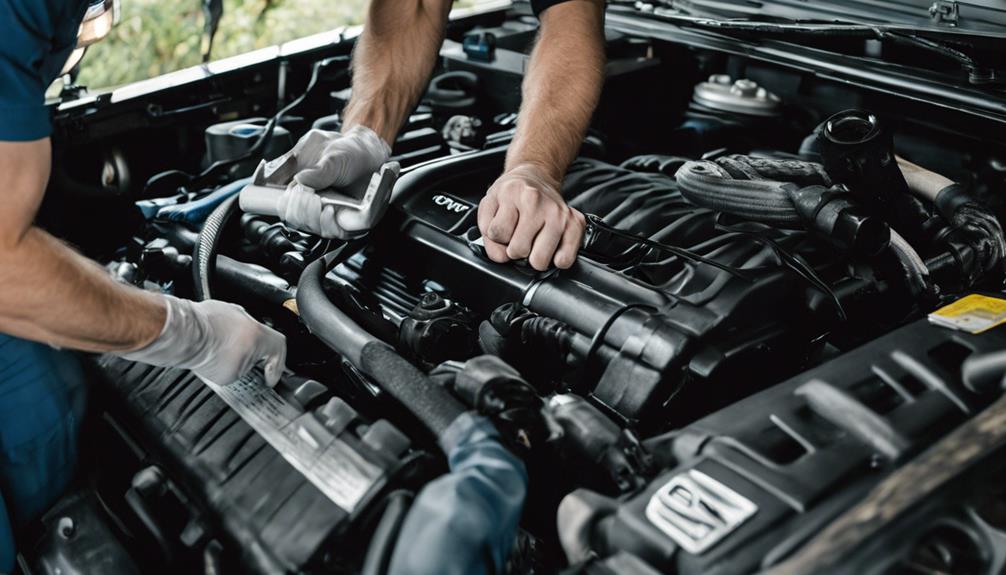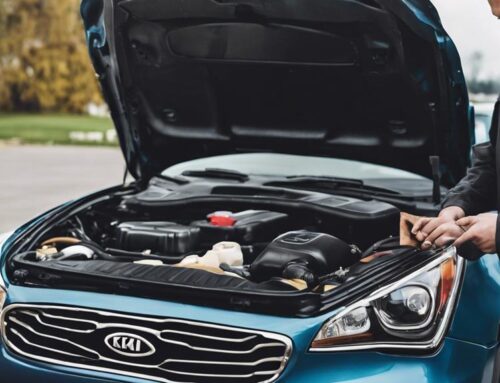Maintaining your Toyota 4Runner is essential for its performance and longevity. Make sure to schedule regular oil changes every 5,000-7,500 miles using high-quality 5W-30 oil. Rotate your tires every 5,000 miles and keep an eye on tire pressure and damage. Consistent mechanic visits help catch smaller issues before they escalate. Inspect belts and hoses periodically to avoid costly repairs. Stick to 87 octane fuel to prevent engine knocking. Regularly oil-spray the undercarriage and apply rust inhibitors to keep rust at bay. By following these important maintenance tips, you'll keep your 4Runner running smoothly and efficiently for years. Find out more tips ahead.
Key Takeaways
- Perform oil changes every 5,000-7,500 miles using high-quality 5W-30 oil.
- Rotate tires every 5,000 miles and maintain correct tire pressure.
- Inspect serpentine belts every 60,000-100,000 miles and check hoses for leaks.
- Stick to 87 octane fuel as recommended for optimal engine performance.
- Oil-spray the undercarriage and apply rust inhibitors to prevent rust and corrosion.
Regular Oil Changes
To keep your Toyota 4Runner running smoothly, make sure you get regular oil changes every 5,000-7,500 miles. Regular oil changes are important for preventing engine overheating and damage. By sticking to this schedule, you guarantee that your engine remains lubricated and cool, which prevents costly repairs down the line.
Using high-quality 5W-30 oil specifically designed for Toyota 4Runners is essential. This type of oil ensures peak engine performance, giving you peace of mind as you drive. Modern lubricants allow for longer intervals between oil changes, but it's still crucial to adhere to the recommended mileage to maintain engine health.
Neglecting oil changes can lead to severe consequences, such as needing an engine replacement, which can set you back $3,000-$4,000. By staying on top of your oil changes, you avoid these hefty costs and keep your 4Runner in peak condition.
Consistent oil changes are necessary for maintaining a healthy engine and ensuring the smooth operation of your vehicle. Don't overlook this simple yet critical maintenance task; it's your key to a reliable and long-lasting Toyota 4Runner.
Consistent Mechanic Visits

Scheduling regular mechanic visits is crucial for the long-term health and performance of your Toyota 4Runner. By consistently visiting the same mechanic, you create a detailed vehicle history, making it easier to diagnose and resolve issues. This relationship allows for personalized service and tailored recommendations specifically for your 4Runner, ensuring it runs smoothly.
Mechanics familiar with your vehicle's history can quickly identify recurring issues and provide efficient solutions, saving you time and hassle. When you have a trusted mechanic, you get consistent quality of service and can better track your maintenance needs over time. Plus, regular visits can lead to cost savings as your mechanic becomes more familiar with your vehicle's specific requirements.
Here's how consistent mechanic visits benefit your 4Runner:
| Benefit | Explanation |
|---|---|
| Detailed Vehicle History | Easier diagnosis and maintenance decisions. |
| Personalized Service | Tailored recommendations for your 4Runner. |
| Quick Issue Identification | Faster resolution of recurring problems. |
| Consistent Quality of Service | Reliable maintenance tracking and execution. |
| Cost Savings | Familiarity with vehicle maintenance needs reduces unnecessary expenses. |
Taking control of your 4Runner's maintenance through regular mechanic visits ensures its longevity and reliable performance. Make these visits a non-negotiable part of your maintenance routine.
Proper Tire Maintenance
Regular visits to your mechanic are important, but proper tire maintenance is equally essential for your 4Runner's performance and safety. Keeping your tires in top shape not only guarantees better traction and handling but also prolongs their lifespan and boosts fuel efficiency. Here are some essential tips for maintaining your 4Runner's tires:
- Rotate Your Tires Every 5,000 Miles: Front and back tires wear differently due to varying weight distributions and driving conditions. Rotating your tires every 5,000 miles promotes even wear, extending their life and enhancing your vehicle's performance.
- Maintain Correct Tire Pressure: Proper tire pressure is crucial for safe driving and peak fuel efficiency. Check your tire pressure regularly, especially before long trips, and adjust as needed according to the manufacturer's specifications.
- Inspect for Damage Regularly: Regularly inspect your tires for any signs of damage such as cuts, punctures, or uneven wear. Catching these issues early can prevent blowouts and other serious problems on the road.
- Monitor Tread Depth: Adequate tread depth is essential for maintaining traction, especially in wet conditions. Use a tread depth gauge to ensure your tires have enough tread to handle various driving conditions safely.
Inspect Belts and Hoses

Your 4Runner's belts and hoses are critical components that need regular inspection to prevent unexpected breakdowns. Checking these parts for cracks, frays, or signs of wear should be part of your routine maintenance. Don't overlook the serpentine belt; it should be inspected every 60,000-100,000 miles. This belt drives essential engine components like the alternator, power steering pump, and air conditioning compressor. If it fails, you could face engine overheating or loss of power steering—issues that can leave you stranded.
Hoses are equally important, especially those in your cooling system. Inspect them regularly for leaks, splits, and overall flexibility. A compromised hose can lead to coolant leaks, causing your engine to overheat, which can result in significant damage and costly repairs.
Use Correct Fuel
When fueling your 4Runner, always stick to 87 octane to keep the engine running smoothly. Avoid the temptation to save money with lower octane or off-brand gas, as it can lead to inefficiency or damage. Also, consider the ethanol content, as too much ethanol can affect performance and fuel economy.
Fuel Grade Matters
For your Toyota 4Runner, it's important to use 87 octane fuel to maintain peak engine performance and avoid potential damage. While it might be tempting to think that higher octane fuels provide better performance, the reality is that your 4Runner is specifically designed to run optimally on 87 octane. Using the wrong fuel octane can lead to engine inefficiency and even potential damage over time.
Here's why sticking to the recommended fuel grade is essential:
- Engine Efficiency: Your 4Runner's engine is calibrated for 87 octane. Using this grade ensures that the engine runs efficiently and smoothly.
- Preventing Damage: Higher or lower octane fuels can cause knocking or pinging, which may lead to long-term engine damage.
- Cost-Effectiveness: 87 octane is typically more affordable than higher octane fuels. You'll save money and maintain engine health by sticking with the recommended grade.
- Manufacturer's Recommendations: Toyota engineers have designed your 4Runner with 87 octane in mind. Following their guidelines ensures you're getting the best performance and longevity from your vehicle.
Avoid Cheap Gas
Opting for quality fuel guarantees that your 4Runner runs at its best and avoids potential issues. Using the correct octane fuel, specifically the 87 octane recommended for Toyota 4Runners, is essential for maintaining engine efficiency and preventing damage. Don't be tempted by cheaper, lower-octane alternatives—these can cause engine knocking and long-term damage that'll cost you more in the long run.
High octane fuel might sound appealing, but it's not always suitable for your 4Runner. Using fuel with a higher octane than recommended can actually lead to decreased engine performance. Your 4Runner is designed to run efficiently on 87 octane, and deviating from this can result in reduced fuel economy and engine efficiency.
Ethanol Considerations
Pay attention to ethanol content in your fuel to make sure your 4Runner's engine runs smoothly and efficiently. Toyota designed the 4Runner to run on 87 octane fuel, so it's important to stick to that specification. Using the right fuel prevents engine inefficiency and potential damage, ensuring you get the best performance from your vehicle.
Here are some key considerations to keep your 4Runner running efficiently:
- Use 87 Octane Fuel Only: Higher octane fuel isn't just unnecessary; it can also harm your engine. Stick to 87 octane to avoid reduced engine performance.
- Avoid Lower Octane Fuel: Lower octane fuel can cause knocking and pinging, leading to engine damage over time. Always fill up with the correct octane rating.
- Check Ethanol Content: Ethanol can affect engine performance and fuel efficiency. Make sure the fuel you choose has the right ethanol blend as specified by Toyota.
- Stay Consistent: Consistency is key. Regularly using the recommended fuel type helps maintain your 4Runner's efficient operation and longevity.
Prevent Rust and Corrosion

Keeping your 4Runner clean and oil-spraying its undercarriage helps prevent rust and corrosion, ensuring its structural integrity remains intact. Regularly washing your vehicle is crucial, especially after driving on salted roads. Salt and debris can accumulate over time, leading to corrosion that compromises your 4Runner's frame and mechanical components.
To stay ahead of rust, apply rust inhibitors or undercoating sprays. These products add an extra layer of protection, making it harder for moisture and salt to penetrate the metal. Be proactive—don't wait for rust to appear. Inspect your 4Runner regularly for any signs of rust or corrosion. If you spot any, address them immediately to prevent further damage.
Avoiding exposure to road salt whenever possible is also key. If you live in an area where salt is commonly used in winter, consider washing your 4Runner more frequently during those months.
Frequently Asked Questions
How Often Should I Replace the Air Filter in My 4runner?
You should replace your 4Runner's air filter every 15,000 to 30,000 miles, depending on your driving conditions. If you drive in dusty or polluted areas, aim for the lower end. Keeping the air filter clean guarantees peak engine performance, improved fuel efficiency, and longer engine life. Don't wait too long; a clogged filter can decrease acceleration and power. Stay proactive to keep your 4Runner running smoothly.
What Are Common Signs of Transmission Issues in a 4runner?
Did you know 90% of transmission failures are due to neglect? If your 4Runner's transmission is slipping, delayed in engagement, or shifting roughly, it's a red flag. Unusual noises like whining, humming, or clunking when shifting gears also indicate problems. Watch for burnt transmission fluid with a dark color or burnt smell, and a check engine light with transmission error codes. Difficulty shifting, especially into reverse, is another common sign.
How Can I Improve the Fuel Efficiency of My 4runner?
To improve your 4Runner's fuel efficiency, keep your tire pressure at the recommended level for a 3% boost. Use the manufacturer-recommended motor oil for best engine performance. Drive smoothly, avoiding rapid acceleration and high speeds. Regular maintenance keeps your vehicle well-tuned and efficient. Consider upgrading to aftermarket air filters or intake systems to potentially enhance fuel economy. Take control by following these steps and watch your fuel efficiency rise.
What Are the Benefits of Using Synthetic Oil in a 4runner?
Using synthetic oil in your 4Runner guarantees several benefits. You'll get better engine protection against wear and tear, thanks to its superior lubrication. It handles high temperatures well, reducing the risk of oil breakdown and engine damage. You'll also enjoy improved fuel efficiency and extended oil change intervals up to 10,000 miles, saving you time and money. Overall, it secures your 4Runner's performance and longevity.
When Should I Replace the Spark Plugs in My 4runner?
An ounce of prevention is worth a pound of cure, so replace your 4Runner's spark plugs every 30,000 to 100,000 miles, depending on the type. Faulty plugs can hurt fuel economy and cause engine misfires. Upgrading to iridium or platinum plugs boosts performance and longevity. Regularly check spark plug wires for wear and tear, too. Stick to the manufacturer's guidelines to keep your engine running smoothly and efficiently.









